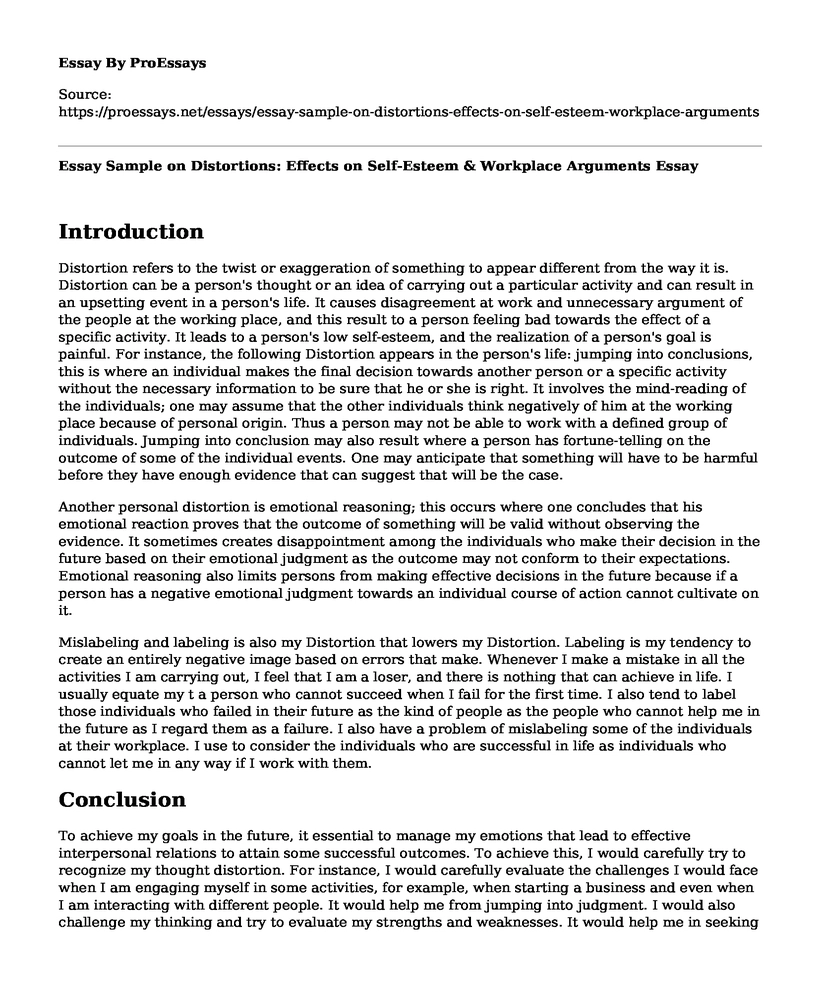Introduction
Distortion refers to the twist or exaggeration of something to appear different from the way it is. Distortion can be a person's thought or an idea of carrying out a particular activity and can result in an upsetting event in a person's life. It causes disagreement at work and unnecessary argument of the people at the working place, and this result to a person feeling bad towards the effect of a specific activity. It leads to a person's low self-esteem, and the realization of a person's goal is painful. For instance, the following Distortion appears in the person's life: jumping into conclusions, this is where an individual makes the final decision towards another person or a specific activity without the necessary information to be sure that he or she is right. It involves the mind-reading of the individuals; one may assume that the other individuals think negatively of him at the working place because of personal origin. Thus a person may not be able to work with a defined group of individuals. Jumping into conclusion may also result where a person has fortune-telling on the outcome of some of the individual events. One may anticipate that something will have to be harmful before they have enough evidence that can suggest that will be the case.
Another personal distortion is emotional reasoning; this occurs where one concludes that his emotional reaction proves that the outcome of something will be valid without observing the evidence. It sometimes creates disappointment among the individuals who make their decision in the future based on their emotional judgment as the outcome may not conform to their expectations. Emotional reasoning also limits persons from making effective decisions in the future because if a person has a negative emotional judgment towards an individual course of action cannot cultivate on it.
Mislabeling and labeling is also my Distortion that lowers my Distortion. Labeling is my tendency to create an entirely negative image based on errors that make. Whenever I make a mistake in all the activities I am carrying out, I feel that I am a loser, and there is nothing that can achieve in life. I usually equate my t a person who cannot succeed when I fail for the first time. I also tend to label those individuals who failed in their future as the kind of people as the people who cannot help me in the future as I regard them as a failure. I also have a problem of mislabeling some of the individuals at their workplace. I use to consider the individuals who are successful in life as individuals who cannot let me in any way if I work with them.
Conclusion
To achieve my goals in the future, it essential to manage my emotions that lead to effective interpersonal relations to attain some successful outcomes. To achieve this, I would carefully try to recognize my thought distortion. For instance, I would carefully evaluate the challenges I would face when I am engaging myself in some activities, for example, when starting a business and even when I am interacting with different people. It would help me from jumping into judgment. I would also challenge my thinking and try to evaluate my strengths and weaknesses. It would help me in seeking guidance where necessary and concentrate on my strength and thus avoid emotional reasoning when making my personal decisions. It also would help me not regarding myself as a failure as I would help me in seeking guidance where necessary and thus promoting self-esteem.
Cite this page
Essay Sample on Distortions: Effects on Self-Esteem & Workplace Arguments. (2023, Mar 27). Retrieved from https://proessays.net/essays/essay-sample-on-distortions-effects-on-self-esteem-workplace-arguments
If you are the original author of this essay and no longer wish to have it published on the ProEssays website, please click below to request its removal:
- Essay Sample on Sufism Meditation
- Effect of Music Therapy on the Cognitive Functions, Anxiety, and Depressive Symptoms
- Essay Sample on Body Image
- Stress Management: Effective Techniques to Cope and Deal - Essay Sample
- Essay Example on Yingying and Zhang: A Tale of Tragic Love
- Personality vs Situation: Who Influences Behavior Most? - Essay Sample
- Paper Example on Exploring Experiential Marketing, Consumer Purchase Behaviour, Value, and Positivism







